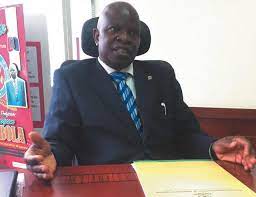Naira Still Strong, Average Nigerian Can Feed With N500–CIBN Ex-president
Former President, Chartered Institute of Bankers of Nigeria, Prof Segun Ajibola, has said that the naira is still strong within the Nigerian economy, adding that an average Nigerian can still feed with N500.
Ajibola said, “The national currency is a reflection of the state of any economy. It encapsulates the strengths and the weaknesses of that economy.
“Over the years, we have seen (a) slide in the value of our national currency. In the 70s and 80s, almost 2$/N1, today we are talking of over N500 (per dollar).”
He said despite the downward trend, “Our naira is still very strong locally. With N500, an average Nigerian can still feed himself or herself today but when we look at N500 in terms of a dollar or a pound sterling equivalent, you can’t do anything with one pound on the street of London, you cannot buy anything meaningful with one dollar on the street of New York.
“Therefore, there is (a) disconnect between what the real value of our naira commands in Nigeria vis-à-vis outside.
“In economic parlance, we talk about purchasing power parity, what is the real value of the currency compared with the value of currencies outside that jurisdiction? We discover that our local currency as naira is still in a position to command some value within the country but outside the country, we have a problem.”
For weeks, the naira had maintained its downward trend, selling at over N500/$ at the black market while the naira traded around N412/$ at the I&E forex window which is the only official rate recognised by the Central Bank of Nigeria.
Concerned, the CBN in July had stopped selling forex to Bureau De Change operators and asked legitimate travellers to approach the banks to access cheap forex but the banks have been inundated with fake demands.
The CBN Governor, Godwin Emefiele, had said that the BDCs defeated their purpose of existence to provide forex to retail users and had become wholesale and illegal dealers.
Also, Emefiele, last Friday, said that the Federal Government would track the owner of Aboki FX, an online platform that gathers and displays parallel market rates in Nigeria, and stop the operations of the website in the country.
The apex bank governor also accused the owner of the website, a London-based Nigerian, Oniwinde Adedotun, of “speculative activities on the naira”, adding that he has to explain how he obtains his rates.
This is based on the rate of the rise of the naira on the parallel market which is currently trading at over N570/dollar.
Aboxi FX subsequently said it would no longer provide daily updates on foreign exchange rates for now and hoped that the naira would stabilise.
Speaking on the activities of speculators on the naira, the CIBN former president said speculation is common in any market.
“The problem today is that our currency, the naira, is subject of speculation, here and there, and you have speculation in any kind of market when there is dichotomy between demand and supply,” he said.
Ajibola stated that the black market came into being because the official market is unable to meet the demands of Nigerians for forex
According to him, the demand for the naira has grown because Nigerians’ appetite to consume “anything imported is insatiable”.
He said, “Speculation is as old as mankind…We will always have speculators because the demand is even immeasurable”. He, however, urged the CBN to work and earn the trust of Nigerians and make citizens believe the apex bank’s rate –the I&E forex window– more than speculators.
“There is no authority that can meet up that kind of demand for the dollar but the authority has the power, has the firepower to simmer down the impact of the speculators.
“So, the disconnect we have now is: as a country, we have not been able to control the activities of the speculators such that foreign exchange users look up to the speculators for what is likely to be the ruling rate at any point in time compared with what should be the case; where the authority (CBN) should be trusted more and the users look up to the authority for what should be the value, the exchange rate of the naira at any point in time,” the CIBN ex-president said.
Ajibola further lamented that though Nigeria imports so much, the little produced in the country is not acceptable in the international market.
The don urged the Federal Government to strengthen non-oil exports through giving of incentives and enabling environment to those in the manufacturing and agricultural sectors, noting that the appreciation of the naira against the dollar could be achieved through a vibrant exportation industry.





